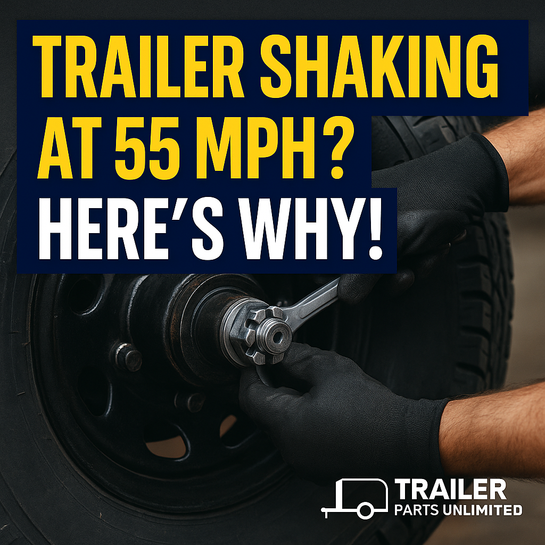If you’re towing your trailer and it suddenly starts shaking or vibrating around 55 MPH, don’t ignore it.
This isn’t just an annoyance — it’s a warning sign. Left unchecked, it can cause major damage to your trailer, tires, axles, or even lead to a dangerous accident.
Here’s a simple, straight-to-the-point breakdown of what’s causing it and how to fix it fast.
Top Reasons Your Trailer Shakes at Highway Speeds
1. Tire or Wheel Balance Issues
-
Tires or wheels may not be properly balanced.
-
Missing wheel weights can cause vibration at certain speeds.
-
Cheap trailer tires often aren’t balanced from the factory.
2. Bad or Worn Tires
-
Tread separation inside the tire is common and dangerous.
-
Out-of-round tires from long storage periods can create bad vibrations.
3. Hub, Bearing, or Loose Castle Nut Problems
-
Worn or loose bearings cause instability.
-
Loose hubs from improperly tightened castle nuts are a major cause of shaking.
-
Always torque the hub’s castle nut correctly and install a new cotter pin.
4. Axle Problems
-
Bent axle tubes or bent spindles cause the wheels to track unevenly.
-
Loose U-bolts can allow the axle to shift under load.
5. Suspension Issues
-
Worn out bushings, shackles, or hangers lead to rough and unstable rides.
6. Improper Load Distribution
-
Too much weight behind the trailer axles (not enough tongue weight) causes sway and shake.
-
Tongue weight should generally be 10–15% of total trailer weight.
How to Fix It Fast: Priority Checklist
If you want to diagnose the problem without wasting time or money, here’s your Priority Checklist:
Step 1: Inspect Your Tires
-
Look for cracks, bubbles, flat spots, or strange tread wear.
-
Replace any questionable tires immediately.
Step 2: Check Tire Pressure
-
Match PSI to the number listed on the tire sidewall, not your tow vehicle's door sticker.
Step 3: Check Wheel Balance
-
Have all trailer tires spin-balanced at a tire shop.
-
Replace any wheels that are bent or damaged.
Step 4: Spin Test Each Wheel
-
Jack up the trailer and spin each wheel by hand.
-
Look for wobbling and listen for grinding sounds.
Step 5: Check Your Bearings and Castle Nut
-
After a drive, carefully touch each hub.
-
If one hub is significantly hotter or colder than the others, it’s a bearing issue.
-
Manually check for play by rocking the wheel top to bottom — if it moves, the castle nut may need to be properly tightened and pinned.
Step 6: Inspect Your Axles and Suspension
-
Look for bent axles, loose U-bolts, worn bushings, or broken spring hangers.
Step 7: Check Your Load Distribution
-
Make sure 10–15% of your trailer’s total weight is on the hitch (tongue weight).
Most Common Fixes (Cheapest to Most Expensive)
-
Adjust tire pressures – Free
-
Tighten loose hub castle nuts and install new cotter pins – Free to very low cost
-
Replace bad tires – $100–$300
-
Balance your wheels – $40–$100 total
-
Service hubs and bearings – $50–$200 depending on DIY or shop
-
Replace axles (if bent) – $400+
Pro Tip: Don’t Guess — Inspect
Most trailer shakes at 55 MPH are simple problems like bad tires, loose hubs, or unbalanced wheels.
A quick inspection and basic service can save you hundreds or even thousands in repairs.
If you catch a bearing, hub, or axle problem early, you’ll avoid catastrophic failures down the road — literally.
Need Help?
At Trailer Parts Unlimited in Huntsville, TX, we stock top-quality tires, wheels, hubs, bearings, axles, and more — all at wholesale prices.
Stop by at 631 TX 75 N, Huntsville, TX 77320 (Exit 118 off I-45, next to Pilot and Chicken Express), or call us at 844-898-8687 to get your trailer rolling smooth again.
Pickup or worldwide shipping available!
Trailerpartsunlimited.com
#TrailerPartsUnlimited #TrailerRepair #TrailerTires #TrailerMaintenance #AxleRepair

